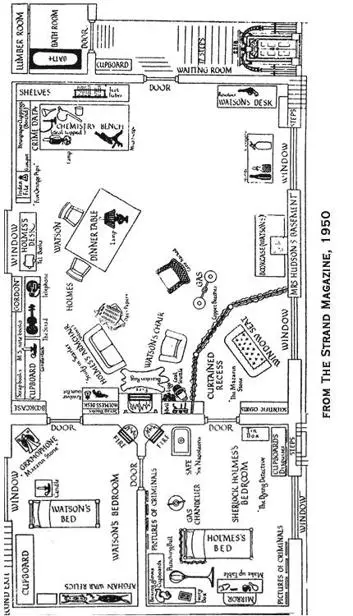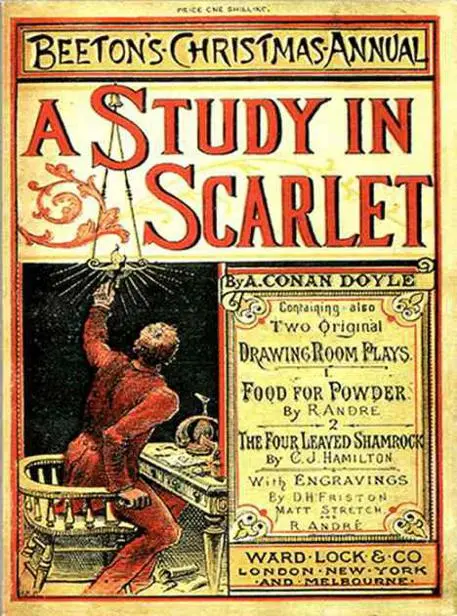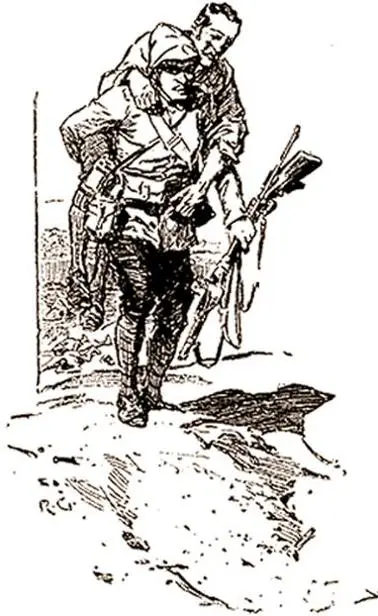If he forgot a date or fact from a previous story, he forged ahead without looking it up. This bad habit has resulted in some startling discrepancies. Was Watson wounded in the leg or the arm? How could Watson's deceased wife be on a visit to her mother's? Is Watson's given name "James" or "John"? To correct these and other inconsistencies, Sherlockians comb the "canon," or "sacred writings," for clues, seek secondary sources (inventing some themselves when all else fails), and write "scholarly" articles, using Holmes's methods to solve contradictions in the works or following clues to add new "facts" to Holmes's and Watson's biographies.
One favorite Sherlockian controversy centers on the "original" location of 221b Baker Street, a non-existent address in Conan Doyle's time. When Baker Street was renumbered during the 1920s, 221b was created on the block formerly called Upper Baker Street. Many faithful representations of the sitting room at 221b Baker Street have been constructed throughout the world. All contain the violin, the tobacco-holding Persian slipper, and other Holmesian accouterments mentioned in the stories.

The Game is played seriously, but is played best when it avoids pomposity. Christopher Morley once wrote, "What other body of modern literature is esteemed as much for its errors as its felicities?" Conan Doyle, on the other hand, wondered why anyone "should spend such pains on such material." He alone, it seems, was immune to the fascination exerted by Sherlock Holmes and John Watson on generations of readers.

Being a reprint from the reminiscences of John H. Watson, M.D., late of the Army Medical Department.

Mr. Sherlock Holmes
The Science of Deduction
The Lauriston Garden Mystery
What John Rance Had To Tell
Our Advertisement Brings a Visitor
Tobias Gregson Shows What He Can Do
Light in the Darkness
On The Great Alkali Plain
The Flower of Utah
John Ferrier Talks With the Prophet
A Flight for Life
The Avenging Angels
A Continuation of the Reminiscences
 of John Watson, M.D.
of John Watson, M.D.
The Conclusion
Title Index
Next | TOC | Study in Scarlet

In the year 1878 I took my degree of Doctor of Medicine of the University of London, and proceeded to Netley to go through the course prescribed for surgeons in the army. Having completed my studies there, I was duly attached to the Fifth Northumberland Fusiliers as Assistant Surgeon. The regiment was stationed in India at the time, and before I could join it, the second Afghan war had broken out. On landing at Bombay, I learned that my corps had advanced through the passes, and was already deep in the enemy's country. I followed, however, with many other officers who were in the same situation as myself, and succeeded in reaching Candahar in safety, where I found my regiment, and at once entered upon my new duties.

The campaign brought honours and promotion to many, but for me it had nothing but misfortune and disaster. I was removed from my brigade and attached to the Berkshires, with whom I served at the fatal battle of Maiwand. There I was struck on the shoulder by a Jezail bullet, which shattered the bone and grazed the subclavian artery. I should have fallen into the hands of the murderous Ghazis had it not been for the devotion and courage shown by Murray, my orderly, who threw me across a pack-horse, and succeeded in bringing me safely to the British lines.
Worn with pain, and weak from the prolonged hardships which I had undergone, I was removed, with a great train of wounded sufferers, to the base hospital at Peshawar. Here I rallied, and had already improved so far as to be able to walk about the wards, and even to bask a little upon the verandah, when I was struck down by enteric fever, that curse of our Indian possessions. For months my life was despaired of, and when at last I came to myself and became convalescent, I was so weak and emaciated that a medical board determined that not a day should be lost in sending me back to England. I was dispatched, accordingly, in the troopship Orontes, and landed a month later on Portsmouth jetty, with my health irretrievably ruined, but with permission from a paternal government to spend the next nine months in attempting to improve it.
I had neither kith nor kin in England, and was therefore as free as air—or as free as an income of eleven shillings and sixpence a day will permit a man to be. Under such circumstances, I naturally gravitated to London, that great cesspool into which all the loungers and idlers of the Empire are irresistibly drained. There I stayed for some time at a private hotel in the Strand, leading a comfortless, meaningless existence, and spending such money as I had, considerably more freely than I ought. So alarming did the state of my finances become, that I soon realized that I must either leave the metropolis and rusticate somewhere in the country, or that I must make a complete alteration in my style of living. Choosing the latter alternative, I began by making up my mind to leave the hotel, and to take up my quarters in some less pretentious and less expensive domicile.
On the very day that I had come to this conclusion, I was standing at the Criterion Bar, when someone tapped me on the shoulder, and turning round I recognized young Stamford, who had been a dresser under me at Bart's. The sight of a friendly face in the great wilderness of London is a pleasant thing indeed to a lonely man. In old days Stamford had never been a particular crony of mine, but now I hailed him with enthusiasm, and he, in his turn, appeared to be delighted to see me. In the exuberance of my joy, I asked him to lunch with me at the Holborn, and we started off together in a hansom.
"Whatever have you been doing with yourself, Watson?" he asked in undisguised wonder, as we rattled through the crowded London streets. "You are as thin as a lath and as brown as a nut."
I gave him a short sketch of my adventures, and had hardly concluded it by the time that we reached our destination.
"Poor devil!" he said, commiseratingly, after he had listened to my misfortunes. "What are you up to now?"
"Looking for lodgings", I answered. "Trying to solve the problem as to whether it is possible to get comfortable rooms at a reasonable price."
"That's a strange thing," remarked my companion; "you are the second man to-day that has used that expression to me."
"And who was the first?" I asked.
"A fellow who is working at the chemical laboratory up at the hospital.
1 comment